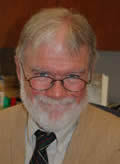
In the last quarter of the 19th century, near what has since become Gallup, New Mexico, while the United States and its military were persecuting the Navajo people, an Irish-born U.S. Army surgeon named Washington Matthews, who had learned the Navajo language and wanted to know more about these Native American victims of ethnic cleansing, sat down with Old Torlino, a Navajo priest.
Matthews asked Torlino who the Navajo people were and where they came from.
Before beginning to tell this occupying army officer and amateur anthropologist what he knew of Creation, Old Torlino, determined to speak only the truth, began to pray this way:
I am ashamed before the earth;
I am ashamed before the heavens;
I am ashamed before the dawn;
I am ashamed before the evening twilight;
I am ashamed before the blue sky;
I am ashamed before the sun
I am ashamed before that standing within me which speaks with me…
I’ll remember and, I hope, share some of that shame in a few days when, at the noon Mass in the crypt of the Basilica of the Sacred Heart, a priest will inscribe a small ashen cross on my forehead and remind me that I came from dust, that I am dust and that I will become dust. Like Torlino, who wished to give a true account of how things are and why they are the way they are, abject humility and genuine sorrow for my being what I am seems a good place to start the journey from death to new life that is Lent.
But I hope I’ll also remember that the shame is just that, a start.
Like all liturgy, like everything that Christians do, Ash Wednesday is about defeating death. Thomas Merton may well have had the beginning of Lent in mind when he expressed wonder that it was possible to be simultaneously Christian and sane. And each year it really is something to see: All these otherwise normal men, women and children, pleased to be alive and going about their business on an otherwise unremarkable weekday with reminders of what Freud called “the death instinct” smudged as dirty crosses above their eyebrows.
It isn’t difficult to understand how the vastness, beauty and lavish generosity of creation could evoke shame in an old Navajo priest witnessing his people’s last days, and it shouldn’t be difficult to understand how a certainty that God has promised that we will share his own life and being evokes in us ordinary Ash Wednesday churchgoers, if not exactly shame, at least a sense of how incapable we are of such sharing. Our ashes remind us of how much God means to reverse.
A glimpse of how much God means to reverse can be seen in a letter written by Flannery O’Connor shortly before she died.
O’Connor spent most of her brief adult life writing astonishing and numinous works of fiction and suffering from disseminated lupus, an incurable autoimmune disease then treatable only by the use of steroid drugs. Even in the extremity of her pain, she was a prolific and generous correspondent, and not long before she died, she wrote to a friend who was in the throes of a crisis of belief.
“To see Christ as God and man is probably no more difficult today than it has always been even if today there seem to be more reasons to doubt,” O’Connor wrote. “For you it may be a matter of not being able to accept what you call a suspension of the laws of the flesh and the physical, but for my part I think that when I know what the laws of the flesh and physical really are, then I will know what God is. We know them as we see them, not as God sees them. For me, it is the virgin birth, the Incarnation, the resurrection which are the true laws of the flesh and physical. Death, decay, destruction are the suspension of these laws.
“I am always astonished at the emphasis the Church puts on the body,” she continued. “It is not the soul she says that will rise but the body, glorified. I have always thought that purity was the most mysterious of the virtues, but it occurs to me that it would never have entered the human consciousness to conceive of purity if we were not to look forward to a resurrection of the body, which will be flesh and spirit united in peace the way they were in Christ. The resurrection of Christ seems the high point in the law of nature.”
Ash Wednesday is a paradoxically happy day, the day when we dare to consider what the restoration of nature, the restoration of ourselves, will really be. When we learn and are astonished by what God has in mind even for dust like us.
Michael Garvey is Notre Dame’s assistant director of public information and communication. Email him at garvey.2@nd.edu.